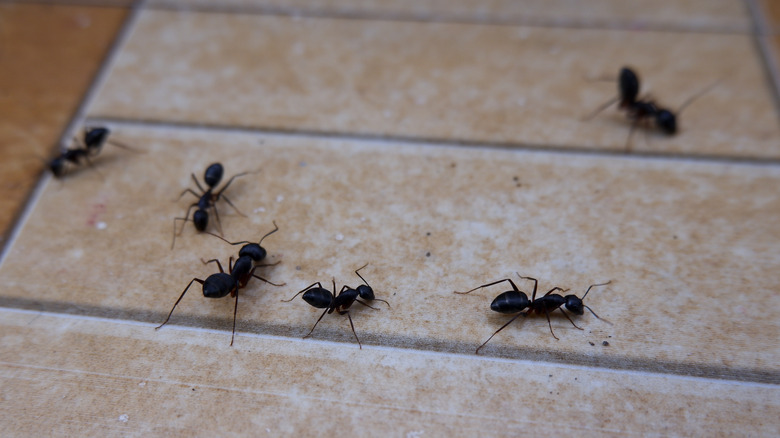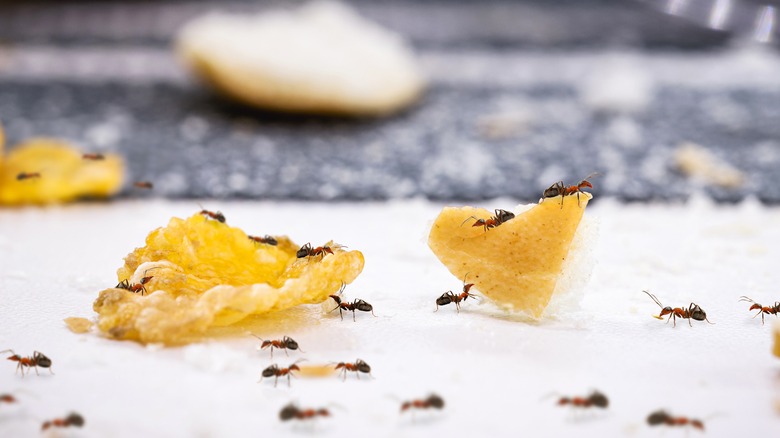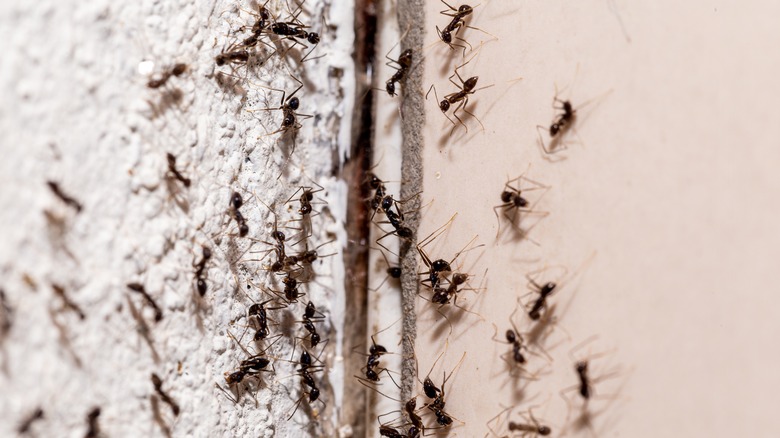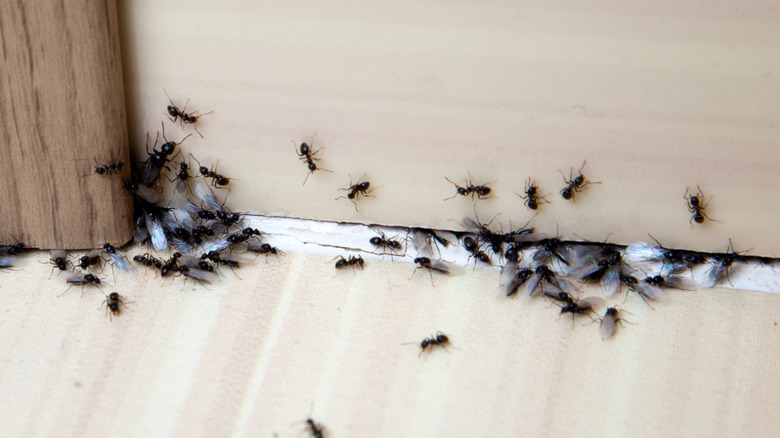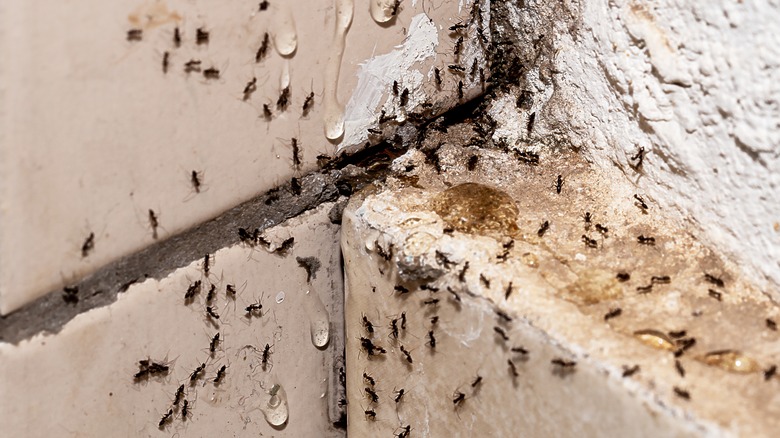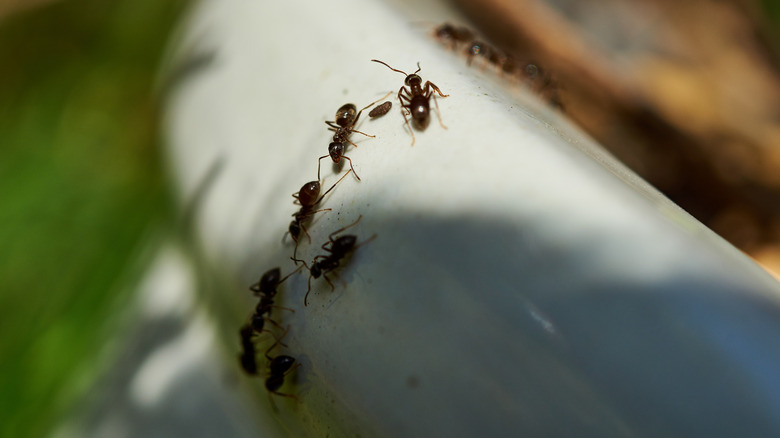5 Things That Are Making It Easy For Ants To Wander Into Your Home
If you find your home becoming a hub for ants, you're likely inadvertently rolling out the red carpet for these tiny invaders. These unwelcome guests are attracted to the simplest of things in your daily routine. From leaving food out, not sealing cracks in walls, to neglecting gaps under the doors, each of these acts can be an open invitation. Other factors, like excess humidity, moisture, and even infested potted plants, can further exacerbate the situation.
According to the University of Kentucky, ants top the list as the most commonly encountered pests. Although they play an important role in soil health, they aren't as charming when they're trailing across your kitchen counter. These tiny creatures are also part of complex colonies, which work tirelessly to gather resources and expand their domain. Each member, from the foragers to the queen, plays a vital role in this highly organized system. If their presence is left unaddressed, these minor oversights can turn into a full-blown ant infestation, bringing along various problems ranging from food contamination to structural damage. It's important to note that different ant species have unique preferences that might lead them into your home. Each one may require different strategies to manage. Once you have a clear grasp of what's drawing them in, you can devise a targeted strategy to keep ants off of your property.
Leaving food out
Ants are on a relentless search for food, which means even the smallest oversight on your part can attract them. Your casual cookie crumb or a sticky juice spill is like a feast announcement for these critters. It's hard to believe, but ants can smell better than most insects, all thanks to their super-sensitive antennae — they can pick up the scent of food from a surprisingly long distance. Interestingly, different ants have their own food preferences. For instance, carpenter ants are big on fatty foods, while sugar ants have a sweet tooth. Therefore, leaving food out is a big no-no. So, in a nutshell, a clean house is your first line of defense — a little more attention to cleaning, and you're sending a clear message to those ants: "Party's over, guys!" It might mean a bit more elbow grease, but it's worth it to keep those pesky ants at bay.
Wipe up any spills as soon as they happen, store food in containers that seal tight, and make sure your floors are swept regularly. Kitchens and dining areas are like magnets, so you'll want to give these spaces extra attention. But it's not just about cleaning up after meals. Think about all those sneaky spots where crumbs love to hide, like under your fridge or in the corners of your cabinets. And if you have pets, their food dishes can be a major attraction for ants. Keep those bowls clean and the pet food sealed up.
Not sealing cracks in walls
Dealing with ants can feel a bit like playing detective in your own home. These tiny critters are masters at finding the smallest of entry points. You know those small cracks and crevices in your walls? They're like revolving doors for ants. These gaps provide the easiest access to the warmth and goodies your home has to offer. The trick is to spot these entrances and block them. You should regularly inspect your home for any cracks or holes, especially around windows, doors, and the foundation. Those areas are like main highways for ants. Once spotted, grab some caulk or another suitable sealant and close them up.
Keep in mind that different types of ants have their own preferences for where they sneak in. Carpenter ants, for example, love wood — they chew out wooden structures to create their nests. They might be eyeing those slightly damaged areas on your doors. Pavement ants, on the other hand, are more likely to march through cracks in your foundation or walls. And if there's a tiny gap under your door, that's an invitation for any ant. But here's something crucial to know: even the smallest crack can be enough for ants to get through. It's not just about blocking visible holes; you'll also have to be thorough and meticulous in your inspections to ensure every possible entrance route is blocked. This will require a bit of work, but it will be worth it.
Having gaps under the doors
Gaps under doors are like open gates for ants and other pests. Believe it or not, these gaps are not a design flaw; they're intentionally put there to prevent your door from scratching the floor as it opens and closes. Additionally, it allows for better air circulation throughout. These gaps usually measure between half an inch and three-quarters of an inch, though they can differ based on the kind of flooring you have. While it might feel like it reduces privacy a bit, this gap is quite handy. If you'd rather not have them, try adding a door sweep. When installing them, it's all about the fit. You want these to be snug against the threshold because even a small gap can be a big welcome sign for ants.
If you're dealing with sliding doors or you've got a bigger gap than usual, weather stripping your doors creates a tighter seal. Plus, weather stripping is pretty versatile and can fit into some of those awkward spots where a door sweep might not reach. But here's a cool bonus: sealing these gaps isn't just about keeping ants out. It also helps to keep your home more energy-efficient. You'll keep the warm air during the winter and the cool air in the summer, which is great for your comfort and your utility bills.
Excess humidity and moisture
Ants, just like us, are pretty picky about where they hang out. High-moisture areas? Love 'em. Many ant species, especially those like Pharaoh ants, thrive in warmer temperatures. You'll often find them around sinks and in laundry rooms, bathrooms, and kitchens. Moisture ants are another bunch to look out for. These guys are a collective species that loves their water. They're not just visiting for a quick drink; they need significant amounts for survival. Spotting these ants in your house is a red flag for an underlying plumbing problem. They're like little alert systems, letting you know something's up with the moisture levels in your place.
But why does your home get so humid? It could be anything from leaky pipes to a lack of good airflow, or just life — like enjoying those steamy showers without a fan. This builds up humidity over time, creating a perfect hangout for ants. To address this moist situation, check for leaks. A small drip might not seem like much, but it's like a water park for ants. Fix any leaks you find, then think about ventilation. Good airflow in moisture-prone areas like your kitchen and bathroom is super important. Use those exhaust fans, or crack open a window when things get steamy. It might also help to purchase a dehumidifier. They are another great tool in your anti-ant arsenal and are fantastic for pulling excess moisture out of the air.
Having infested potted plants
Potted plants in your home, while lovely, can unwittingly become perfect habitats for ant colonies, particularly if they're not well-maintained. It's crucial to keep an eye on your indoor greenery for any signs of ant activity. If you spot ants, it's a signal to take immediate action. Isolate the affected plant to prevent the ants from migrating to other areas of your home. Overwatering is a big no-no, as it creates damp conditions that ants find irresistible. Ensuring proper drainage is key to keeping the soil conditions unfavorable for ants.
But there's more to it. If your potted plants are infested with aphids, this could be a significant attractant for ants. Aphids and ants have a symbiotic relationship; aphids produce a sweet substance called honeydew, which is a favorite treat for ants. In exchange for this sugary reward, ants offer protection to aphids from predators. This relationship can lead to an increase in both aphid and ant populations in your indoor plants. Dealing with aphid issues is super important in this case. You can use an insecticidal soap to keep these tiny pests, and consequently ants, at bay.
